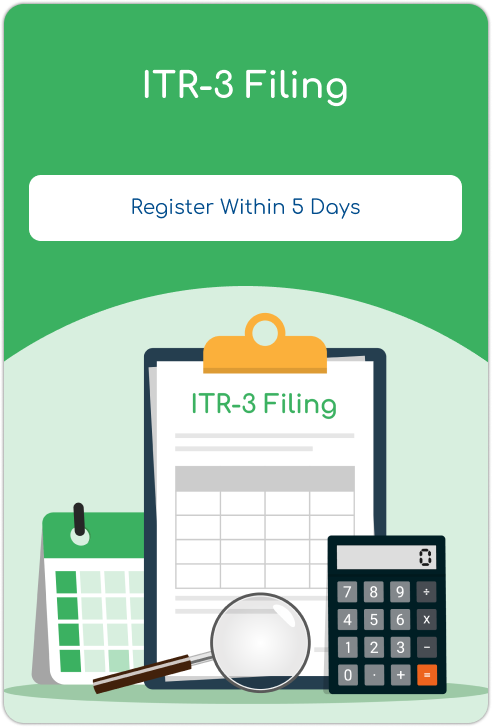
File Your ITR-3
14132 customers
What will you get?
Billing Application
Access of Android
Access of Web Application
Account Writing
Debtors, Creditors monitoring
Income Tax filling
GST Compliances
Financial Planning
Loan Advisory Service
What do we Require?
INR 0 Taxes As Applicable
















Introduction
Income Tax Return Form 3, commonly known as ITR-3, holds significant importance in the realm of income tax compliance in India, catering specifically to individuals and income from business or profession. Unlike the more straightforward ITR forms, ITR-3 is tailored to accommodate the complexities and nuances associated with entrepreneurial ventures, professional practices, and other business activities. In this detailed introduction, we delve into the intricacies and significance of ITR-3 filing, elucidating its role in facilitating compliance with the country's tax laws and fostering transparency in reporting income, profits, and losses arising from business endeavours. ProMunim is proud to introduce our specialized ITR-3 Filing Service, designed to meet the unique needs and challenges of individuals and business or profession. With our comprehensive service, taxpayers can navigate the complexities of Income Tax Return Form 3 (ITR-3) with ease and confidence. Our platform offers a user- friendly interface and expert guidance, ensuring accurate reporting of income, expenses, profits, and losses associated with entrepreneurial ventures and professional practices. Backed by a team of seasoned tax professionals and cutting-edge technology, ProMunim's ITR-3 Filing Service streamlines the tax filing process, enabling taxpayers to comply with regulatory requirements seamlessly. Let ProMunim be your trusted partner in navigating the intricacies of ITR-3 filing, empowering you to focus on your business endeavours while we handle the intricacies of tax compliance with precision and efficiency.
Eligibility:
Income Tax Return Form 3 (ITR-3) is specifically designed for individuals and income from business or profession. Here are the key eligibility criteria for filing ITR-3:
- TIncome from Business or Profession:Taxpayers who have income from any business or professional activities, including but not limited to freelancers, consultants, sole proprietors, partners in firms, and professionals like doctors, lawyers, architects, etc., are eligible to file ITR-3.
- Complex Financial Affairs:Individuals and HUFs with relatively complex financial affairs, particularly that involving business income, may find ITR-3 more suitable for their tax filing requirements compared to simpler ITR forms like ITR-1 or ITR-2.
- Not Eligible for ITR-1 or ITR-2:Taxpayers whose income exceeds the limits prescribed for filing ITR-1 (Sahaj) or ITR-2 and who have income from business or profession must file ITR-3.
- No Salary Income:While taxpayers with salary income can also have business or profession income, if salary income is the primary source of income and there is no income from business or profession, then ITR-3 is not applicable.
- HUFs with Business Income:Hindu Undivided Families (HUFs) that have income from business or profession are also eligible to file ITR-3.
Documents Requirement:
- Profit and Loss Statement:Prepare a Profit and Loss Statement, also known as an Income Statement, detailing the income earned and expenses incurred during the financial year related to the business or profession.
- Balance Sheet:Balance Sheet summarizing the financial position of the business or profession at the end of the financial year, including assets, liabilities, and capital.
- Audited Financial Statements:If the taxpayer's accounts are required to be audited under the Income Tax Act, audited financial statements prepared by a Chartered Accountant (CA) are necessary.
- Bank Statements:Gather bank statements for all business-related accounts, including current accounts and savings accounts, to verify transactions and reconcile financial records.
- Invoices and Receipts:Collect invoices, bills, receipts, and vouchers related to business income, expenses, purchases, sales, and payments made during the financial year.
- TDS Certificates:Obtain Tax Deducted at Source (TDS) certificates for any tax deducted on business income, rent, commission, etc., during the financial year.
- Goods and Services Tax (GST) Returns:If applicable, gather GST returns filed during the financial year, along with relevant documents such as GST invoices, credit notes, debit notes, etc.
- Business Registration Documents:Include documents related to the registration of the business or profession, such as partnership deed, certificate of incorporation, proprietorship registration certificate, etc.
- Income Tax Payment Challans:Collect Income Tax payment challans or receipts for advance tax, self- assessment tax, or any other tax payments made during the financial year.
- Other Business-related Documents:Depending on the nature of the business or profession, additional documents such as lease agreements, contracts, agreements, licenses, permits, etc., may be required.
Due date for ITR 3 filing:
For Individuals other than Companies and Income from business or profession (whose accounts are not required to be audited): the due date for filing ITR 3 is generally July 31st of the assessment year. For Individuals and Income from business or profession whose accounts are required to be audited: the due date for filing ITR 3 is typically September 30th of the assessment year. However, it's essential to check for any changes in the due dates announced by the Income Tax Department.
Late Filing ITR-3:
- If the return is filed after the due date but on or before December 31 of the assessment year, a late fee of up to Rs. 5,000 may apply.
- If the return is filed after December 31 of the assessment year, a late fee of up to Rs. 10,000 may apply.
- However, if the total income of the taxpayer does not exceed Rs. 5 lakhs, the maximum late filing fee is capped at Rs. 1,000.
- Interest on Delayed Payment of Taxes:In addition to the late filing fee, if the taxpayer has any tax dues pending, interest under Section 234A, 234B, and 234C may apply on the outstanding amount. This interest is calculated from the due date of filing the return to the actual date of filing.
- Loss of Certain Deductions and Benefits:Late filing of ITR-3 may result in the loss of certain deductions and benefits. For example, taxpayers may not be able to carry forward certain losses if the return is filed after the due date.
- Restrictions on Refunds:Late filing can also lead to delays in processing refunds, as the Income Tax Department prioritizes timely filed returns for processing.
Benefits of Deduction:
Filing Income Tax Return (ITR) using Form ITR-3 comes with several benefits, particularly regarding the utilization of deductions available under different sections of the Income Tax Act. These deductions offer taxpayers opportunities to substantially lower their taxable income, thereby reducing their overall tax liabilities. By leveraging deductions provided under sections such as 80C, 80D, 80E, among others, individuals and Hindu Undivided Families (HUFs) engaged in business or profession can maximize their tax savings. These deductions facilitate strategic tax planning, allowing taxpayers to invest in essential avenues like provident funds, health insurance premiums, and education loans while simultaneously enjoying tax benefits. Furthermore, the availability of deductions encourages prudent financial management, promoting investments in critical areas and fostering long-term financial stability. By claiming deductions in their ITR-3 filings, taxpayers not only ensure compliance with tax regulations but also optimize their tax planning strategies to achieve their financial objectives effectively.

